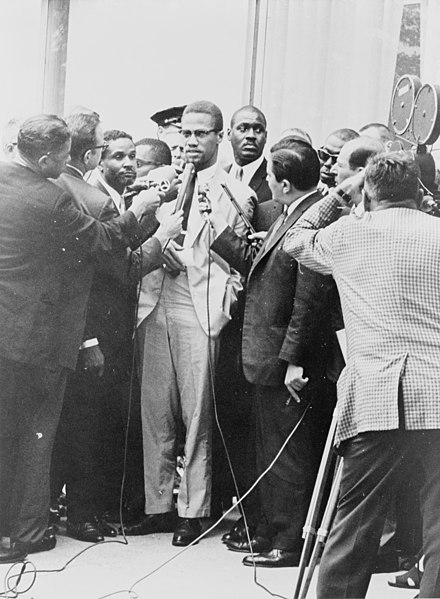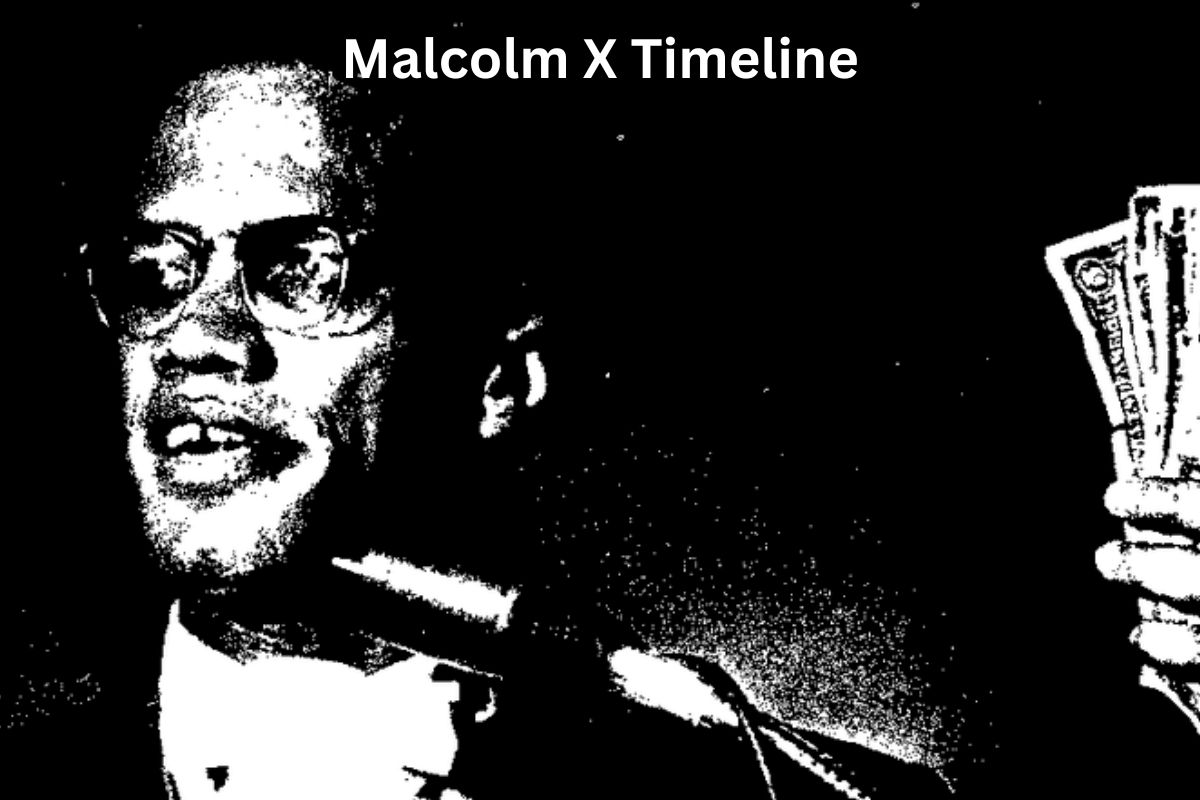Malcolm X, born Malcolm Little on May 19, 1925, was a prominent civil rights activist, speaker, and advocate for Black empowerment.
His life journey took him from a troubled childhood marked by racial discrimination and personal loss to becoming one of the most influential figures in the struggle for racial equality.
Malcolm’s intellectual growth, transformation during his time in prison, and his leadership within the Nation of Islam propelled him to national prominence. Throughout his life, he championed self-determination, racial pride, and the fight against systemic racism.
Malcolm X’s powerful speeches, unwavering commitment to justice, and evolving ideologies continue to inspire and influence people around the world.
Timeline of Malcolm X
1925: Malcolm X is born in Omaha, Nebraska
Malcolm X is born as Malcolm Little in Omaha, Nebraska. Malcolm Little was born to Earl Little and Louise Norton Little. He was the fourth of seven children.
His father, Earl Little, was an outspoken Baptist preacher and a follower of Marcus Garvey’s Universal Negro Improvement Association.
Malcolm’s family faced racial discrimination, and his father’s activism made them targets of violence from white supremacist groups.
1931: Family moves to Lansing, Michigan
When Malcolm was around six years old, his family moved to Lansing, Michigan, seeking to escape the increasing threats and violence they faced in Omaha. However, racial tensions and discrimination were still prevalent in their new community.
Also Read: Facts About Malcolm X
Earl Little continued his activism and advocacy for Black rights, which influenced Malcolm’s later commitment to social justice.

1939: Father’s death
Malcolm’s father, Earl Little, is killed in a suspicious streetcar accident. Tragedy struck the Little family when Malcolm was just 14 years old. His father, Earl Little, was found dead on the tracks of a streetcar line.
Also Read: Accomplishments of Malcolm X
The official cause of death was listed as a streetcar accident, but there were strong indications that his father’s death was a targeted act of violence due to his activism.
This event deeply impacted Malcolm and had a profound effect on his worldview, fueling his determination to fight against racial injustice and oppression.
1941: Mother is committed to a mental institution
Malcolm’s mother, Louise Little, is committed to a mental institution. Following the death of his father, Malcolm and his siblings faced further hardship when their mother, Louise Little, experienced a mental breakdown.
She was subsequently committed to a state mental institution. As a result, Malcolm and his siblings were separated and placed in various foster homes and orphanages. This disruption in his family life had a profound impact on Malcolm’s upbringing and sense of identity.
1946: Malcolm is paroled from prison
Malcolm’s troubled adolescence led him down a path of criminal activities, and at the age of 20, he was arrested and sentenced to prison for burglary charges. During his time behind bars, Malcolm began a transformative journey of education and self-reflection.
He delved into books, particularly works by Elijah Muhammad and the teachings of the Nation of Islam. This period of incarceration became a turning point in Malcolm’s life, sparking his intellectual growth and eventual conversion to Islam.
1948: Converts to the Nation of Islam
Malcolm converts to the Nation of Islam while serving a prison sentence in Massachusetts. While in prison, Malcolm X’s brother Reginald introduced him to the teachings of the Nation of Islam, a Black nationalist religious movement led by Elijah Muhammad.
Influenced by the teachings of Elijah Muhammad, Malcolm underwent a profound spiritual and ideological transformation. He embraced the principles of the Nation of Islam, including black pride, self-reliance, and separation from white society.
After his release from prison, Malcolm X became a devoted member and spokesperson for the Nation of Islam.
1952: Released from prison, becomes prominent in the Nation of Islam
Malcolm is released from prison and becomes a prominent figure within the Nation of Islam. Following his parole, Malcolm X immersed himself in the activities of the Nation of Islam.
He rose through the ranks, displaying exceptional oratory skills and becoming a charismatic and influential figure within the organization. Malcolm’s passionate speeches and uncompromising stance against racial oppression garnered attention and attracted a growing number of followers to the Nation of Islam.
His powerful advocacy for Black empowerment and self-defense against racism made him a prominent voice in the civil rights movement.

1954: Becomes minister of Temple Number Seven in Harlem, New York
Malcolm X becomes the minister of Temple Number Seven in Harlem, New York. In 1954, Malcolm X was appointed as the minister of Temple Number Seven, the Nation of Islam’s flagship mosque, located in Harlem, New York.
As the minister, he was responsible for delivering sermons, organizing community activities, and leading the local congregation. Malcolm’s fiery and passionate speeches drew large crowds and solidified his reputation as a compelling and influential speaker.
His leadership in Harlem further elevated his status within the Nation of Islam and brought attention to the organization’s teachings and goals.
1957: Marries Betty X (later Betty Shabazz)
Malcolm marries Betty X (later known as Betty Shabazz) and they have six children together. In 1957, Malcolm X married Betty X, who later changed her name to Betty Shabazz after their marriage.
Betty Shabazz was a dedicated supporter of Malcolm’s activism and played a significant role in his life. Together, they had six daughters:
- Attallah
- Qubilah
- Ilyasah
- Gamilah
- Malikah
- Malaak
The marriage and the expanding family brought stability to Malcolm’s personal life and provided him with a supportive and loving environment amidst the challenges of his public role.
1959: Makes pilgrimage to Mecca
Malcolm X makes his first pilgrimage to Mecca, which significantly influences his views on race and religion. In 1959, Malcolm X embarked on a life-changing journey to Mecca, Saudi Arabia, to perform the Hajj, the Islamic pilgrimage.
During this pilgrimage, Malcolm had a profound spiritual and intellectual awakening. He was struck by the diversity and unity among Muslims of different races and nationalities, which challenged his previous views on race and white people.
Malcolm’s experience in Mecca led him to reevaluate his beliefs about racial separation and fueled his commitment to a more inclusive and universal understanding of Islam. This transformation marked a significant shift in his ideology and his approach to civil rights activism.
1963: Gains national attention as a spokesperson for the Nation of Islam
Malcolm X becomes a prominent national spokesperson for the Nation of Islam and gains media attention. By the early 1960s, Malcolm X had emerged as a prominent national spokesperson for the Nation of Islam.
His dynamic speaking style, unwavering commitment to Black empowerment, and sharp critique of racial injustice attracted significant media attention.
Malcolm’s eloquence and unapologetic advocacy for self-defense and the rights of African Americans made him a powerful voice in the civil rights movement.
He appeared on various television and radio programs, participated in debates, and delivered influential speeches that resonated with Black communities across the country.
1964: Splits from the Nation of Islam, founds Muslim Mosque, Inc. and the Organization of Afro-American Unity
Malcolm X publicly splits from the Nation of Islam due to ideological differences with its leader, Elijah Muhammad. In March 1964, tensions between Malcolm X and the leadership of the Nation of Islam, particularly its leader Elijah Muhammad, reached a breaking point.
Malcolm became disillusioned with Elijah Muhammad’s personal conduct, including allegations of extramarital affairs and financial improprieties. Additionally, he grew frustrated with the Nation of Islam’s separatist stance and its refusal to collaborate with other civil rights organizations.
As a result, Malcolm publicly announced his split from the Nation of Islam, which caused controversy within the movement and marked a significant turning point in his life and activism.
Malcolm founds the Muslim Mosque, Inc. and the Organization of Afro-American Unity. Following his departure from the Nation of Islam, Malcolm X established two new organizations to further his vision of Black empowerment and unity.
He founded the Muslim Mosque, Inc., which aimed to provide spiritual guidance and community services to African Americans. Additionally, he formed the Organization of Afro-American Unity, a secular organization focused on political and social activism.
Through these organizations, Malcolm sought to promote self-determination, fight against racial discrimination, and foster solidarity among African Americans and other marginalized groups.
1965: Assassinated on February 21 in New York City
In a tragic turn of events, Malcolm X was assassinated on February 21, 1965, in New York City. During a speaking engagement at the Audubon Ballroom in Manhattan, three members of the Nation of Islam rushed the stage and fired multiple shots at Malcolm X.
He was struck by multiple bullets and succumbed to his injuries shortly after at the age of 39. The assassination of Malcolm X shocked the nation and reverberated throughout the civil rights movement.
His untimely death robbed the world of a charismatic leader and a powerful advocate for justice and equality. However, his legacy and ideas continue to inspire generations of activists fighting against racial injustice.
